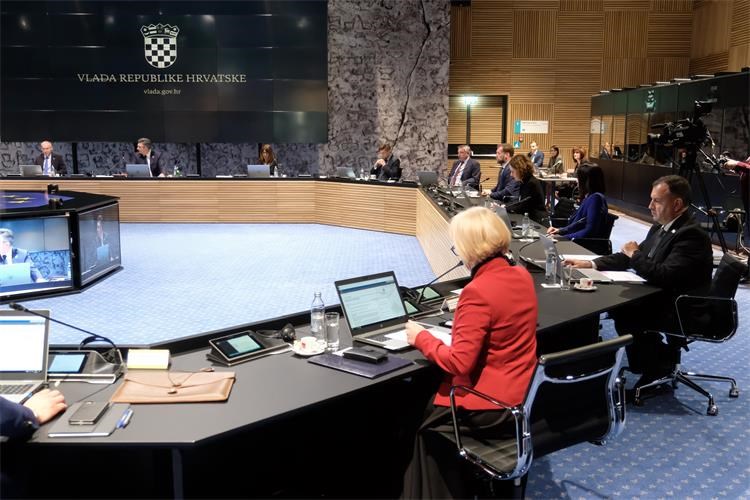The Croatian government made a decision at its session on Thursday to designate respiratory intensive care units for treating patients infected with the coronavirus and to develop a digital platform and establish interoperability between authorities to monitor the virus.
"The situation in Croatia and neighbouring countries calls for taking new, urgent measures aimed at establishing respiratory intensive care centres to be used solely for treating patients infected with the coronavirus, and this has been planned in Croatia, depending on the development of the epidemic," Health Minister Vili Beros said.
In the Clinical Hospital Dubrava a primary centre for Zagreb and the surrounding area is being established, with a capacity of 300 beds, and part of the hospital's capacity will be urgently adjusted to accommodate patients, while the hospital's main building remains a backup option in case the epidemic escalates, Beros said.
Similar primary centres will be established in Rijeka, Split and Osijek, depending on the development of the epidemiological situation, and preparations are for the main part complete, Health Minister said.
The government also made a decision to develop a digital platform and establish interoperability between the authorities of the Croatian Institute of Public Health, the local (regional) public health institute, namely that of the City of Zagreb, the State Inspectorate, the Ministry of the Interior (MUP) and the Croatian Health Insurance Fund (HZZO) to monitor and suppress infectious diseases.
Developing a digital platform will enable authorities a better identification and triage in cases of pronounced symptoms of infectious diseases and in cases when people are not yet showing symptoms but have been at risk of infection, Beros said.
Gov't brings forward amendments simplifying work of foreign attorneys in Croatia
The government on Thursday forwarded a bill amending the Legal Profession Act for a first reading in parliament, regulating the provision of legal services in Croatia by attorneys at law from other EU countries.
The proposed amendments allow the provision of legal services that include consultancy on Croatian law. They also provide for lifting the restriction on establishing only one law firm. An attorney will be allowed to enter into an employment relationship with another attorney who has their own legal practice as an employer and to share a law office.
The bill also provides for reducing requirements for entry into the Foreign Attorneys-at-Law Register and for testing foreign attorneys' knowledge of Croatian law.
Electronic communications law to be amended to enable location tracking
The government on Thursday brought forward amendments to the Electronic Communications Act to better protect the lives and health of people in emergencies.
The bill, drafted by the Ministry of Transport and Infrastructure, proposes that in extraordinary situations such as epidemics, outbreaks of infections or natural disasters, the Health Minister be authorised to ask telecommunications companies to provide necessary data on locations without transfer data.
Minister Oleg Butkovic said that the purpose of these amendments was to ensure the protection of national security in cases when the government declares a state of emergency due to natural disasters or when the health minister declares an emergency due to epidemics. when public health cannot be properly protected without processing of such data.
Higher excise taxes on cigarettes, alcohol, soft drinks as of April 1
The price of cigarettes will go up by up to HRK 2 per pack starting April, and there will also be an increase in the prices of alcoholic beverages, soft drinks with higher sugar content and energy drinks, the Croatian government decided on Thursday.
The government adopted regulations governing excise taxes and special taxes on those products. Three regulations were adopted - on excise taxes on tobacco and tobacco products, on excise taxes on alcohol and alcoholic drinks, and on the calculation and variables for special taxes on coffee and soft drinks - to come into force on April 1.
The regulation on excise taxes on tobacco and tobacco products will increase the tax by HRK 35, from HRK 335 to HRK 370 for a thousand products.
The Finance Ministry estimates that the state budget would get an additional HRK 400 million from the increase in the excise tax on tobacco and tobacco products.
The regulation on excise taxes on alcohol and alcohol beverages, the government estimates, would bring an additional HRK 30.3 million.
Excise taxes on beer, wine and other fermented beverages will not change, the government says.
Finance Minister Zdravko Maric said that in the EU Croatia had one of the lowest excise taxes on alcohol, and that it was followed only by Bulgaria.
Underscoring that the regulation on excise taxes had nothing to do with the coronavirus, Maric said that they had been in contact with domestic manufacturers of alcohol and alcoholic beverages.
The government also adopted a regulation on the calculation and variables for special taxes on soft drinks, and the changes were connected to the calculation of the special tax on soft drinks and energy drinks.
Now the excise on soft drinks consists only of a fixed part, HRK 40 per hectolitre, but under the new regulation it will also depend on the volume and sugar content.
The fixed part would remain, but it would be cut to HRK 20 per hectolitre, while the remaining part of the tax would depend on the sugar, taurine and methylxanthine content .
Based on these changes, the state budget should earn an additional HRK 64 million by the end of the year.
Text and photo: Hina
News

